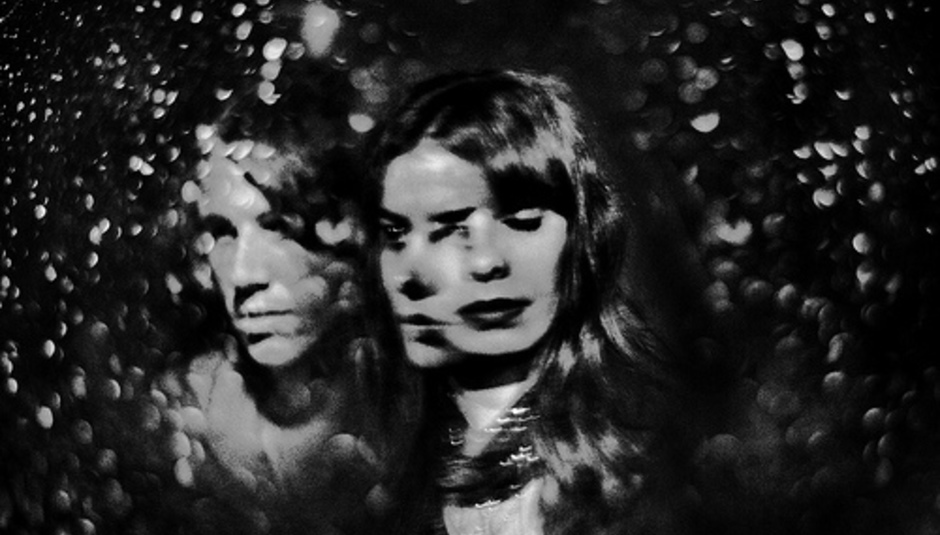Earlier this year something strange and unprecedented happened: DiS editor Sean Adams was rendered near speechless. School Of Seven Bells' third album Ghostory, took the breath away from critics and fans alike as it revisited the themes first heard on the band's debut, Alpinisms, and hammered them home.
Part of the record's appeal was that the band had inflated the subtle aspects of their sound: the vocals were clearer, the beats harder and the melodies stronger. It was a direct approach that was not only evident on the record, but one that was also mirrored in the way the band had created it.
Two years ago, Claudia Deheza (vocalist/keyboardist) abruptly left SVIIB in the middle of a US tour due to 'personal reasons' leaving her sister Alejandra Deheza along with Benjamin Curtis to continue alone. This could and should have broken most bands, but it proved to strengthened Alejandra and Ben bond and galvanise their ambition. A profound sense of release coupled with the band for the first time being in the same head-space, SVIIB embarked on unified goal of making the record they'd always wanted to make: Ghostory.
Meeting Alejandra and Ben in the Lexington, on what has become another customary wet day in London, the pair radiate an infectious enthusiasm that illuminates the grey surroundings. Sipping their pints side-by-side and shouting to be heard over the bar staff's 60s garage playlist, they are as adorably proud of their record as a new band releasing their debut.
At perfect ease in each other's company, they talk freely and in-depth about the 'creative rebirth' that produced Ghoststory, Lafaye the 'ghost' the at the centre of the record, Claudia's departure, their continued fascination with the ethereal and how they're back in love with their band. For School Of Seven Bells, it's been a good, clean break.
You released your third album Ghostory this year. How have you found the reception to the album?
Benjamin Curtis: We’ve been really, I don’t know the words for it, touched. We really had no idea what anyone would think…when we were making the record we kept thinking that we wanted to really communicate the ideas we had really clearly; that was really important to us. We were thinking about the listener in a way, but at the same time it never crossed our minds as to whether this was the record people wanted to hear right now. We knew it was the kind of record we wanted to make, but we never considered if it was what’s ‘happening’ right now.
When we finished the record it was like, ‘shit, here it is. I wonder what people are going to think?’ We really had no idea, so the reactions have been so awesome. We feel like people have really listened to it, really, really touching more so than anything we’ve done so far.
Our editor reviewed the album and he wrote about his personal experience of the record and how it had had a positive affect on his life, even infiltrating his daily routine.
Alejandra Deheza: I read it...that’s what you want.
Ben: That’s success, right there. That’s what you make music for, it’s not so you can wonder, ‘why we did this?’ Or, ‘how does this relate to the latest hip trend?’ That’s what music is, it’s functional; you’ll listen to it why you do things, you think about songs why you do things, you relate songs to moments in your life as they were a part of your life at that point, that’s what music does. It’s the ultimate compliment.
The album’s a lot easier to digest than your previous records as it’s cleaner and simplified, the melodies stand out, you can hear the lyrics. Was it important to you to have a more direct discourse with your fans?
Alejandra: I agree. I feel like with this one there was a lot of very definitive, very deliberate ideas going on. I feel like the other records were definitely explorations, good ones as I feel like that’s important, but I feel like with this one it was kind of the first time we actually knew exactly what we wanted to do.
I came out with lyrics that I knew were just coming out of this theme and Ben was giving me music that was all in the same house; it was all the same movie and that was really awesome. I felt that even though we were doing different things and different things were going on in our lives, our head-spaces were very similar we were in the same mood.
There were no discussions between the two of you? It was just fortuitous to be in the same place?
Alejandra: There were discussions, but I feel like we just knew we were on the same page.
Ben: It was probably the most we’ve trusted each other in the studio. It’s weird when you collaborate with someone there’s always this moment where say you come up with something and someone adds on it and you say, ‘well, what are they trying to do to my idea?’. Or, ‘what am I doing to their idea?’ There’s a push and pull, but I think on Ghostory there was this complete trust. We were throwing everything into the pot and we knew it was going to be awesome.
Did you approach it in the same way as your previous records by writing the lyrics first and then the music?
Alejandra: It was very much us responding to each other as we both came in with a bunch of ideas.
Did Claudia leaving the band push you together as a duo and make you trust and rely on each other more?
Ben: I think so. It’s weird because it’s always been Ally and I writing together. It’s mainly been Ally and I in the studio just working out the ideas and what the record is going to look like and sound like and what the statement was, so in that sense it’s functionally the same.
I think the fact that it’s like all of sudden we were left there and I think the fact we had this crazy determination to keep going and make everything we worked for work; you know the rubble clears, we kind of looked at each other and it was like, “you know what? We’re still here, we’re still doing this’. And, no disrespect to anyone, we realised how much fun it can be again.
Was there ever a point when you thought, ‘we’re not going to do this anymore’?
Alejandra: The whole thing of loosing a member didn’t affect it at all, if anything it was like now we can make our records.
Ben: Let me put it this way, it’s a lot more fun when everyone wants to be doing it. It sounds corny, but it was like. ‘God, what a creative rebirth’. ‘What an exciting moment’. It was just like: ‘this is great, we fucking love being in a band, we love School Of Seven Bells.’
I’ve kind of said it before, but our idea was we’re having so much fun doing this let’s make School Of Seven Bells our favourite band that we want to listen to, that we want to be in. It’s been great, there’s now a cool circle around us…
The record seems more focused than your previous albums as the track lengths have come right down; on your debut there’s tracks that are 11 minutes of long of sprawling soundscapes whereas now you’ve got songs just shy of four minutes, even the song titles are more succinct. Did you want to make it more accessible? Maybe to make it more pop?
Ben: If the song was about a moment when you’re sort of lonely it’s like, 'is that all your getting? Is there something in this song that’s diluting that emotion?' Those things we just tuned out, because we wanted it to be really pure with specific emotions in the songs. I guess, pop music does that but our intent wasn’t to make pop music. It was to be really purely, really singular in emotion.
I think artists are scared of simplicity as they don’t want to look like they’re not capable of more, but sometimes it’s good to give yourself limitations.
Alejandra: It’s much harder to say what you want to say when you have to say it with less or when you choose to. I feel like on the last record the closest thing was ‘I.O.U’ and that was the hardest thing for me to write on that record, because I’ve never been so direct before and it was something I had to learn how to do.
I feel like the kind of directness you get with the lyrics on this record has everything to do with the fact that I was comfortable with those emotions whereas before I thought I was being really clear, but I feel like people were saying, ‘that’s a cute, cool song but I don’t really know what you’re talking about’. I was like ‘Really? I thought it was really clear’.
The record was conceived as a concept album about a girl called Lafaye and the ghosts that haunt her. Where did that come from? Were you concerned about making a concept album?
Alejandra: We didn’t really call it a concept album until afterwards and then people started saying it and we were like, ‘yeah, it is a concept’. I feel like, I didn’t want to come out with saying it.
Ben: We were worried about using that word.
Alejandra: It’s funny as it’s something I’ve always wanted to do. I feel like this time around because I was the main singer, which has usually been the case but I felt like I had to leave some room. I was like, 'I can do something where all the lyrics are one thing'.
When I was writing lyrics I was writing letters to people; all these things that I had said and it wasn’t really something that I set out to do, but that was where all the lyrics that were coming out and they all had that same theme of these situations with these people that I hadn’t really faced fully or I’d never really said what I wanted to say. They were all from different times in my life, but they were all repeating the same pattern. It’s not a novel idea it’s something obvious that happens to people, but I really wanted some way to illustrate it.
A way of addressing your past?
Ben: We realised that was happening half-way through writing it and when we realised that was happening it was actually exciting to go full speed in that direction.
A lot of the ghosts are about love, loss, isolation. Did you hone in on particular themes for each song or were they coming naturally from your past experiences?
Alejandra: It was just coming out that way and I can only write about what I know about. I was also really fascinated by the fact of how much you can change and how much you can be a different person in the situation depending on when it was in your life and who you were surrounding yourself with. I love that idea of that identity that’s changing all the time. That’s what I like about this record is you never know who her character could be in the song; a lot of people could think she’s always the victim, but she isn’t she’s everybody in every song.
By saying it was a concept album about Lafaye as a ghost was it an attempt to remove it from being about yourself?
Alejandra: It’s because it’s a million different me’s and because I know it’s not just me it’s about everybody. And, also when I look back on other times I don’t recognise that person it doesn’t seem like me so it was weird to say it was me when it’s not me any more.
The album has a clear lineage starting with upbeat energy of ‘The Night’ going into the insular, quiet lull of ‘Reappear’ and ‘Show Me Love’ to emerge with the celebratory, ‘White Wind’. Did you want it to be a story of Lafaye in the way that the tracks were sequenced?
Ben: It kind of does, the album moves really deeply inside until after ‘Reappear’. I feel like you do feel things become more external and there’s this sort of revelation and celebration at the end...we’ve never written music that wildly different on a record and it’s weird to think that ‘The Night’ and ‘Reappear’ are on the same record, but it works somehow.
If you had that level of 'up' for the whole record it would loose its intensity
Ben: Listening back to it we suddenly realised: ‘Does this make sense? Does this work?’ ‘Do people want to hear both of these songs together on the same record?’ But, what can you do? We made a really honest record and we couldn’t have made any other record. There’s a certain resignation that if it’s not what people want to hear then maybe people don’t want to hear us right now, but maybe they’ll want to hear us in a year but this is exactly where we’re at right now.
You might have changed the type of people who want to hear you with this record compared to the last albums?
Ben: I don’t mean to sound like there’s been this massive audience change, because what’s been so awesome is that our fans are so amazing. But, it’s awesome when it makes sense to people as it makes perfect sense to us, it’s like: ‘You’re our people!’ [laughs]
Have you ever revisited the original theme of the School Of Seven Bells pickpockets?
Alejandra: Always, the whole idea of ghosts. A lot of people when it comes to us talk about lucid dreaming, because that was a huge way for me to write. Also one of the ideas of all these ghosts is the fact that when you dream every character in my dream is me in some way, so I can be a grown man or a little girl or an older woman. I guess, that theme was revisited in a way that I started noticing in my dreams that I was communicating with these different manifestations of me.
Ben: It’s happened from the beginning. ‘My Cabal’, ‘Camarilla’, ‘Joviann’ we’ve always had these songs with these characters, but they’ve always been spots and elements.
You are associated with the ethereal, otherworldly themes. What draws you to this? Would you ever look towards more traditional subjects for inspiration?
Ben: It’s something that Ally and I bonded on early on is that we think reality is really strange sometimes; you see, but you don’t see things clearly. Like in the way you’re in a crazy mood or if something happens to you and you completely interpret what’s going on as completely false.
We talk about this all the time, so it’s really a great question of how often you actually are down to earth? How often you are actually engaged in reality as you’re always engaged in some sort of subject filter. It’s something we talk about all the time and that’s something we think about a lot in our music; sometimes down to earth, these words, ‘reality’, ‘normal’ are just as mysterious to me as things that are magical and bizarre. It’s all completely ridiculous.
Alejandra: It’s a miracle we’re all functional human beings. It’s all crazy to me.
You said earlier about wanting to be a band you’d want to listen to. Did you refer to bands that you’ve admired? Like, when you first got into bands when you were younger?
Alejandra: I was listening to a lot of Janet Jackson. When I got really into music I was in South Florida and I was listening to a lot of bi-tone and techno, because it gave me that feeling that that I used to love.
Ben: When we’re writing I don’t listen to other music. Like you said, thinking about music that used to move me I was thinking more about the way I remembered those songs. Not exactly how they actually sound, but the way I remember them sounding at the time; it's really interesting as it’s filtered through this personal nostalgia. Just being influenced by that with the tools we have now, rather than trying to replicate anything exactly.
Alejandra: That feeling, that excitement when you would hear a voice or a different progression.
I think music in a way should be more about the experience and the emotions it gives you rather than any sort of anal fascination with the technicality of how it’s been produced.
Ben: Completely agree. We can go on and on about our process, but I think it’s so boring as it’s not important in any way in how you listen to it. The result isn’t how we got there; I mean that’s the trick. Just make sure the seams aren’t showing.
What are your plans for the rest of the year?
Ben: We’re just trying to play as much as possible as it’s so fun right now.
Alejandra: This is probably the most fun we’ve ever had, so it’s like I want to do this as much as possible now everyone’s 100%.






















